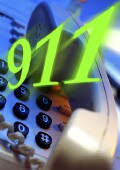
THURSDAY, March 29 (HealthDay News) — Answering 911 calls for help may cause emergency dispatchers to experience symptoms of post-traumatic stress disorder, or PTSD, a new study has found.
Even indirect exposure to traumatic events could lead to psychological disorders, whether a person personally knows the victims or not, according to a report published in the March issue of the Journal of Traumatic Stress.
“Post-traumatic psychological disorders are usually associated with frontline emergency workers, such as police officers, fire fighters or combat veterans,” study author Dr. Michelle Lilly, assistant professor of psychology at Northern Illinois University in DeKalb, Ill., said in a journal news release.
“Usually, research considers links between disorders and how much emotional distress is experienced on the scene of a traumatic event,” Lilly said. “However, this is the first study on emergency dispatchers, who experience the trauma indirectly.”
In conducting the study, the researchers surveyed 171 emergency dispatchers currently working in 24 states across the United States. The dispatchers, who were primarily white women averaging 38 years old with more than 11 years of experience, were questioned about the type of calls they answer and the emotional distress they endured as a result of those calls. They also were asked to rate the types of calls that cause them the most distress and recall the worst call they ever received.
The unexpected injury or death of a child accounted for 16 percent of the calls dispatchers identified as their worst trauma. Nearly 13 percent of the worst calls identified were suicidal callers, about 10 percent were police-officer shootings and another 10 percent involved the unexpected death of an adult, the investigators found.
The study authors noted that the dispatchers experienced a high level of distress following an average of 32 percent of potentially traumatic calls. In addition, 3.5 percent of the dispatchers reported symptoms severe enough to be classified as PTSD.
These new findings may contribute to the debate over the definition of a “traumatic event,” ahead of the publication of official guidelines next year, the news release noted.
“Our research is the first to reveal the extent of emotional distress experienced by emergency dispatchers while on duty,” researcher Heather Pierce, a former 911 dispatcher, said in the news release. “The results show the need to provide these workers with prevention and intervention support as is currently provided for their frontline colleagues. This includes briefings and training in ways to handle emotional distress.”
More information
The U.S. National Institute of Mental Health has more about PTSD.

